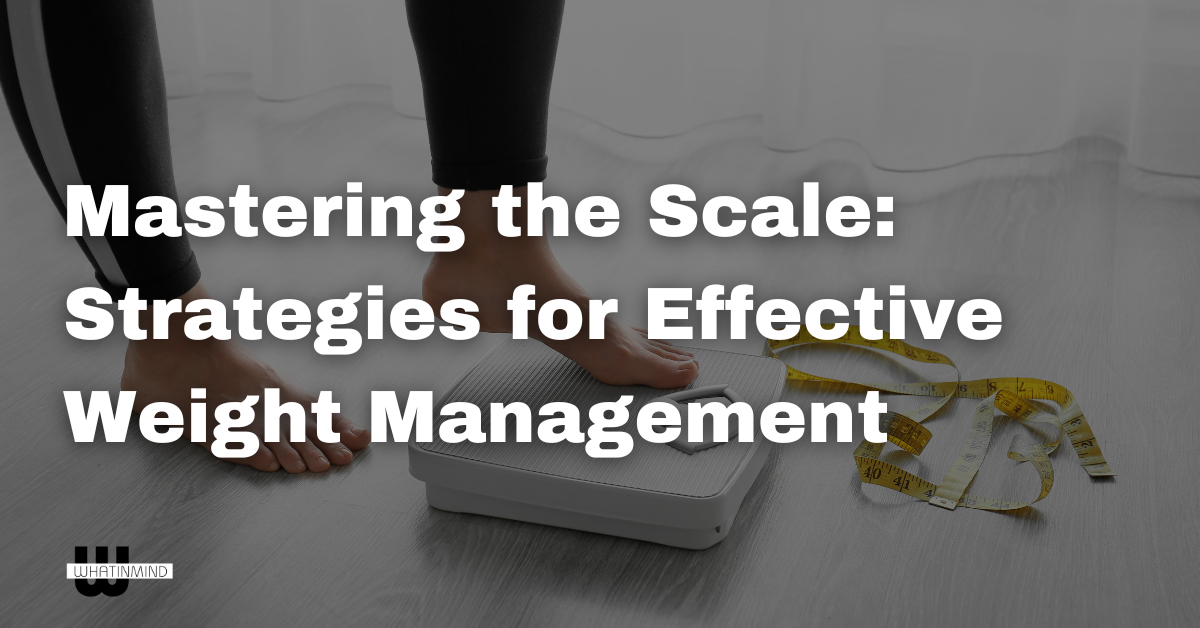In a world where fad diets and quick fixes dominate headlines, achieving and maintaining a healthy weight can seem like an elusive goal. However, effective weight management is not about drastic measures or short-term solutions; it’s about adopting sustainable lifestyle changes that promote overall health and well-being. In this blog post, we’ll explore key strategies for mastering the scale and achieving lasting results.
Table of Contents
Understanding the Basics
Before diving into specific strategies, it’s important to understand the fundamentals of weight management. At its core, weight management is about achieving a balance between the calories consumed and the calories burned. When you consume more calories than your body needs, the excess is stored as fat, leading to weight gain. Conversely, when you burn more calories than you consume, your body taps into its fat stores for energy, resulting in weight loss.
Set Realistic Goals
One of the first steps in effective weight management is setting realistic goals. Rather than focusing solely on a specific number on the scale, consider other factors such as improved energy levels, better sleep, and enhanced overall health. Setting achievable goals not only keeps you motivated but also allows for gradual progress, which is more sustainable in the long run.
Embrace a Balanced Diet
A balanced diet is essential for effective weight management. Instead of restricting certain foods or following strict meal plans, aim for variety and moderation. Fill your plate with whole, nutrient-dense foods such as fruits, vegetables, lean proteins, whole grains, and healthy fats. These foods not only provide essential nutrients but also help keep you feeling satisfied and energized throughout the day.
Practice Portion Control
Portion control plays a significant role in managing calorie intake. Even healthy foods can contribute to weight gain if consumed in large quantities. Be mindful of portion sizes and practice portion control techniques such as using smaller plates, measuring serving sizes, and paying attention to hunger and fullness cues. By eating mindfully and listening to your body, you can prevent overeating and maintain a healthy weight more effectively.
Stay Hydrated
Ensuring you consume sufficient water is essential for maintaining overall health and can also bolster your weight management endeavors. Proper hydration supports digestion, helps control hunger, and contributes to overall well-being. Make it a priority to drink an ample amount of water daily, especially considering Utah’s importance of water purification for safe consumption.
Opt for water as your primary beverage choice over sugary sodas or calorie-heavy drinks. If you find it challenging to meet your hydration goals, consider carrying a reusable water bottle with you and setting reminders to drink water regularly.
Prioritize Physical Activity
Regular physical activity is key to both weight loss and weight maintenance. Aim for a combination of cardiovascular exercise, strength training, and flexibility exercises to promote overall fitness and burn calories. Find activities that you enjoy and make them a regular part of your routine.

Whether it’s walking, cycling, swimming, or dancing, incorporating movement into your daily life can help you achieve and maintain a healthy weight while improving your mood and reducing stress.
Get Adequate Sleep
Quality sleep is often overlooked but is essential for effective weight management. Lack of sleep can disrupt hunger hormones, increase cravings for unhealthy foods, and negatively impact metabolism. Aim for seven to nine hours of quality sleep each night, and establish a consistent sleep schedule to optimize your body’s natural rhythms. Create a relaxing bedtime routine, limit screen time before bed, and create a comfortable sleep environment to promote restful sleep.
Manage Stress
Stress can wreak havoc on your waistline by triggering emotional eating and disrupting hormone levels. Find healthy ways to manage stress, such as practicing mindfulness, meditation, deep breathing exercises, or engaging in hobbies and activities that bring you joy. By reducing stress levels and cultivating a sense of calm, you can better support your weight management efforts and improve your overall well-being.
Seek Support
Effective weight management doesn’t have to be a solo journey. Seek support from friends, family members, or a professional if needed. Joining a support group, working with a registered dietitian, or enlisting the help of a personal trainer can provide accountability, motivation, and guidance along the way. Surround yourself with positive influences who encourage and support your goals, and don’t be afraid to ask for help when needed.
Celebrate Progress
Finally, remember to celebrate your progress along the way. Whether it’s reaching a milestone, fitting into a smaller size, or simply feeling more energetic and confident, take the time to acknowledge and celebrate your achievements. Recognize that effective weight management is a journey, not a destination, and celebrate the small victories that lead to long-term success.
In Conclusion
Mastering the scale and achieving effective weight management requires a holistic approach that encompasses balanced nutrition, regular physical activity, adequate sleep, stress management, and support from others. By incorporating these strategies into your daily life and focusing on sustainable habits, you can achieve lasting results and enjoy improved health and well-being for years to come. Remember, the journey to a healthier you begins with small steps and continues with consistent effort and commitment.




